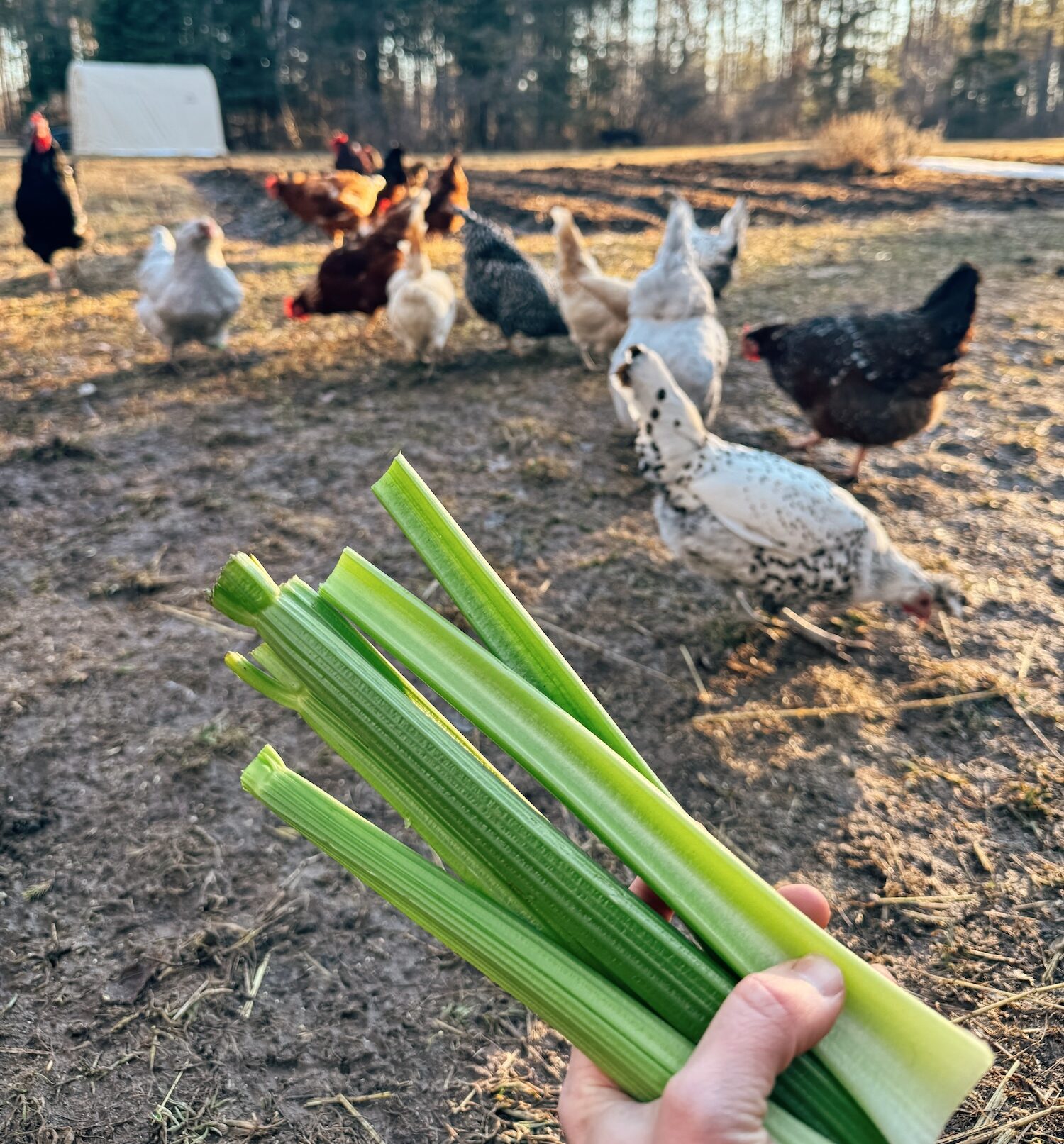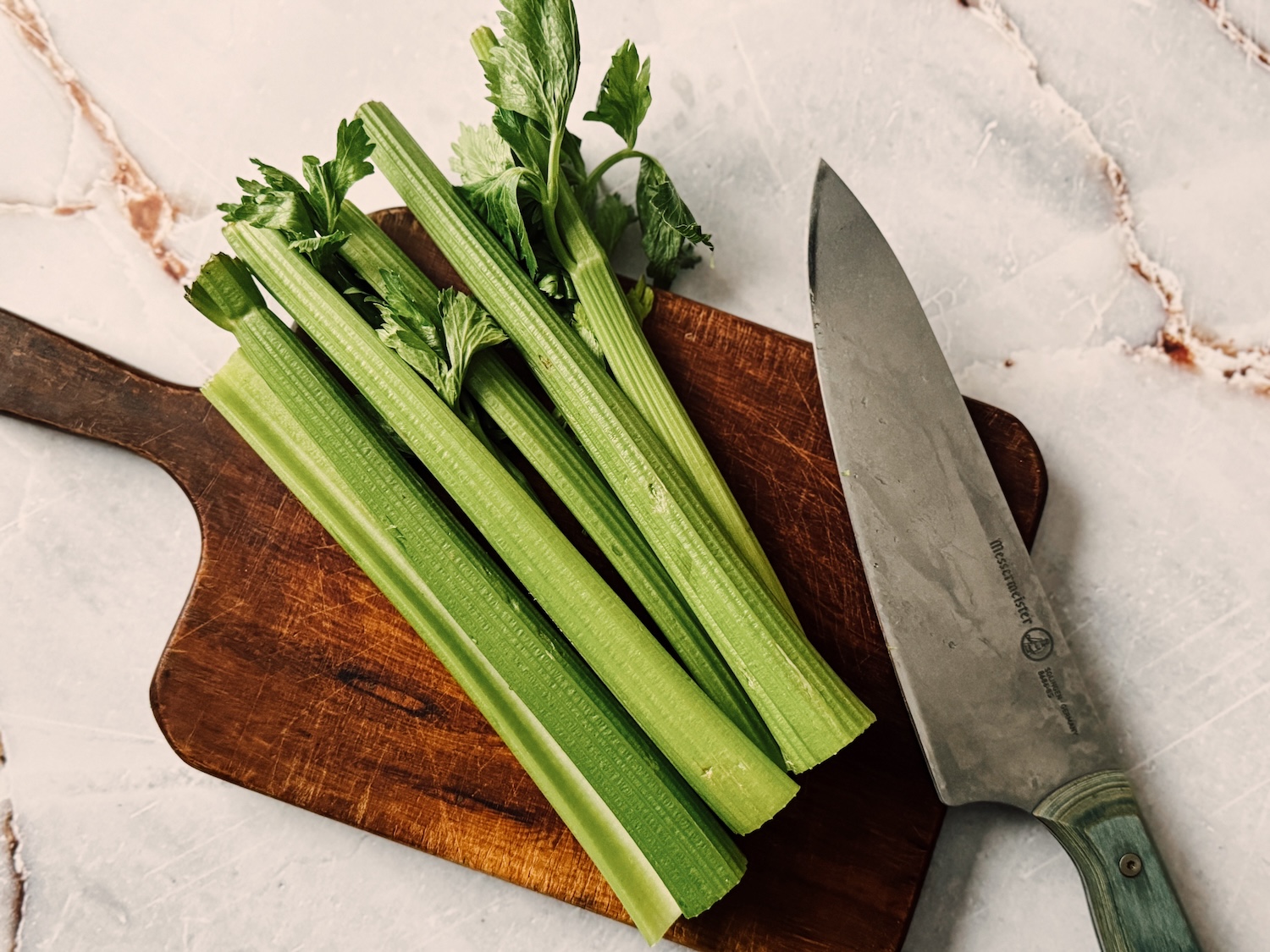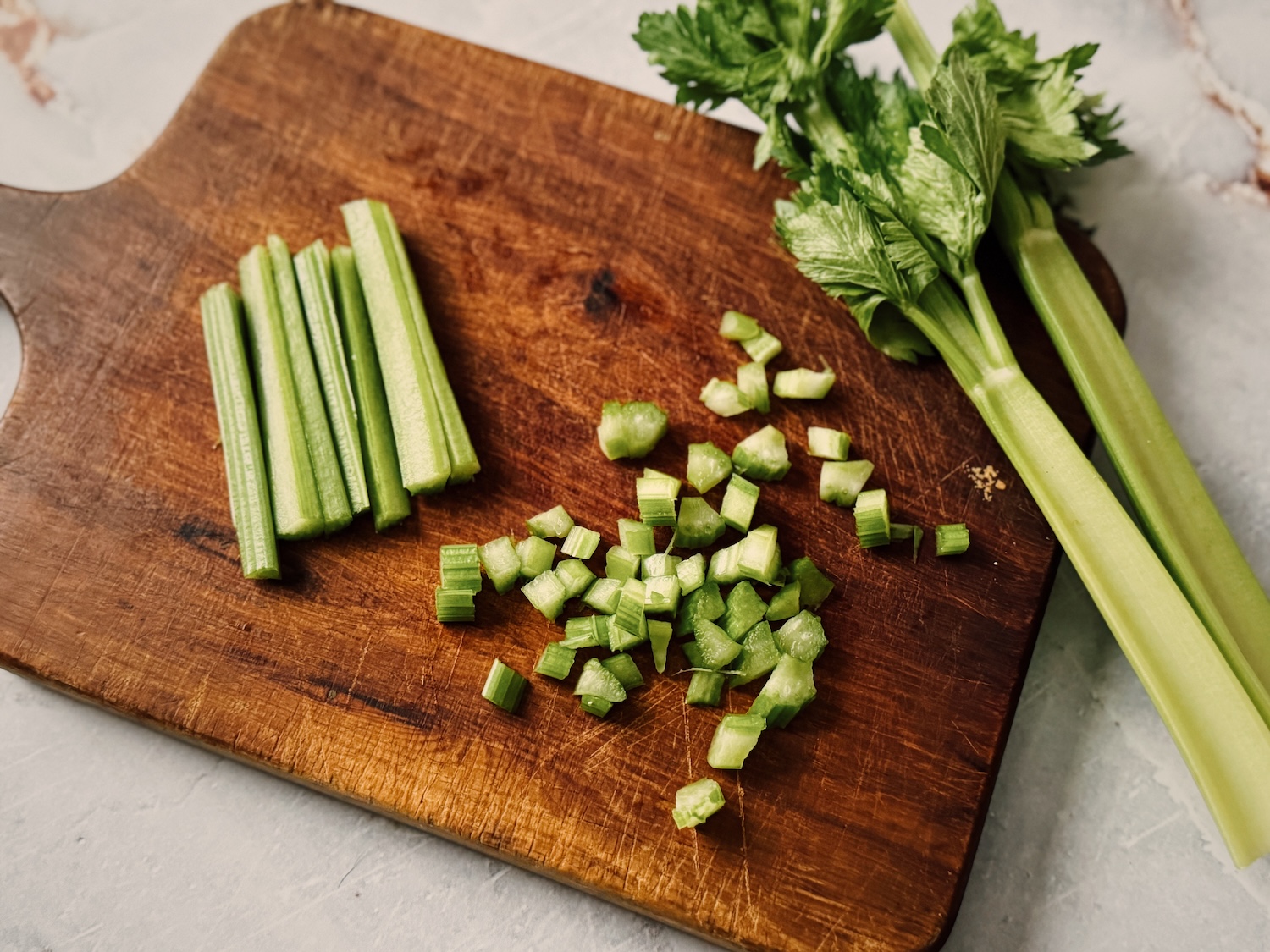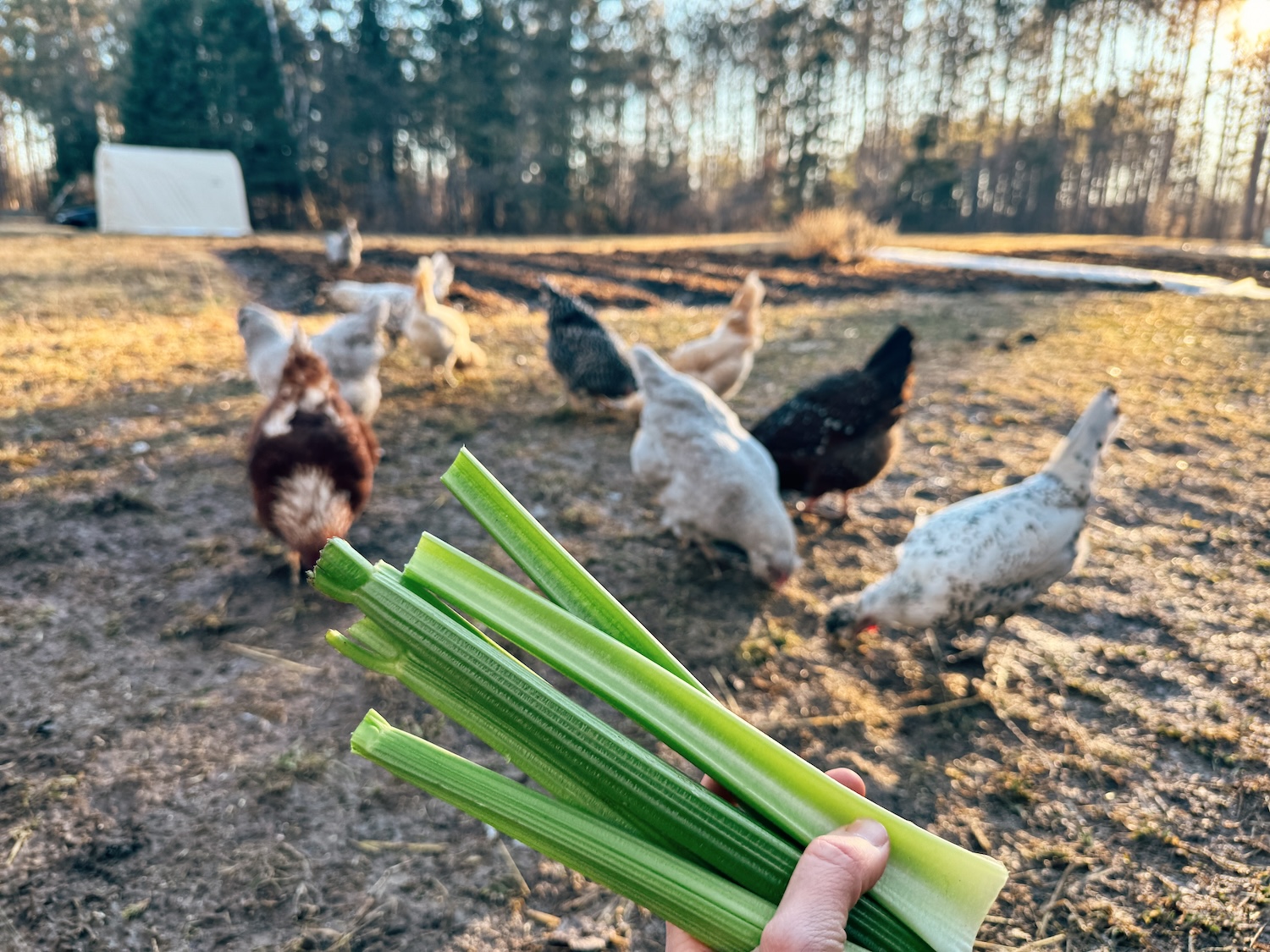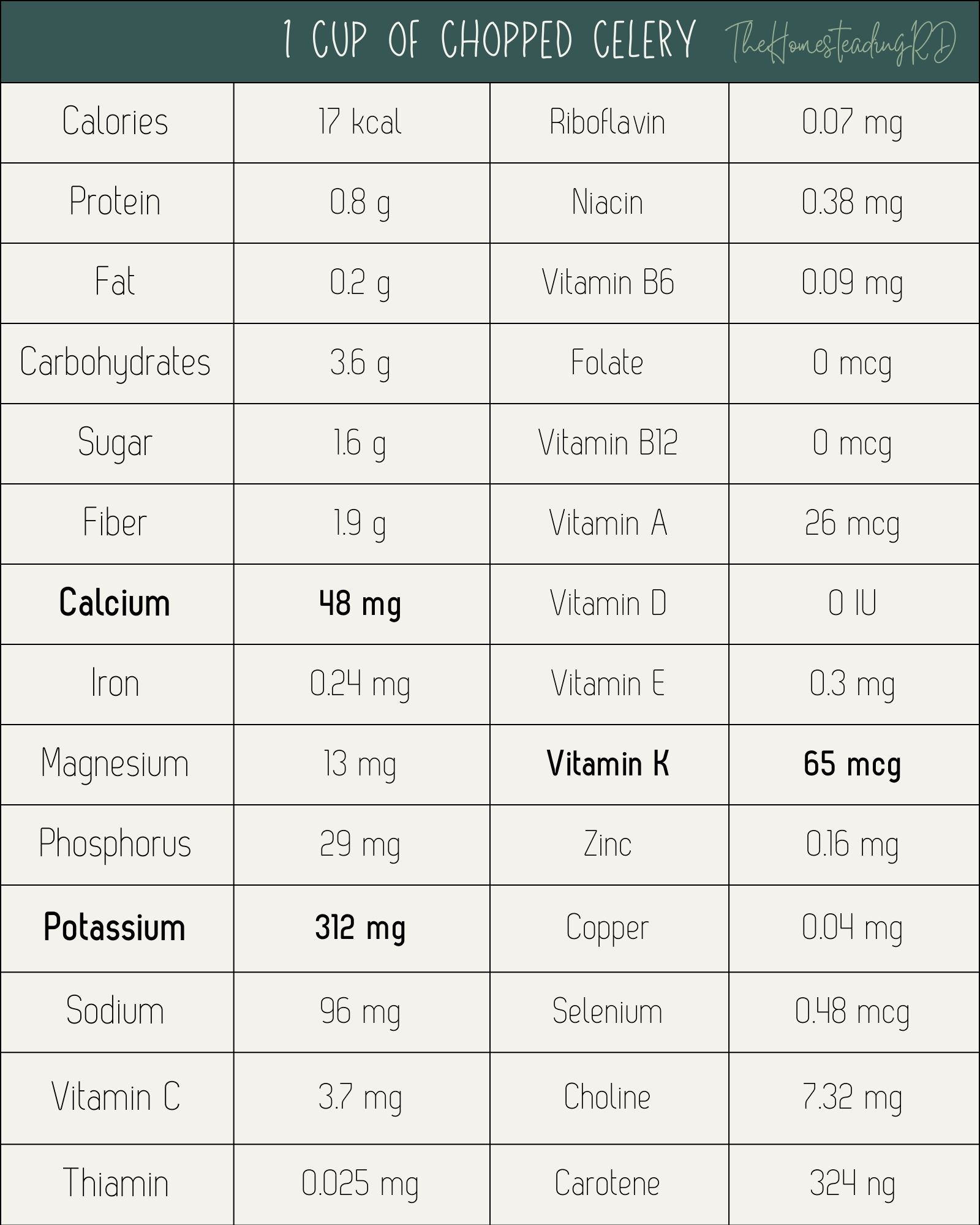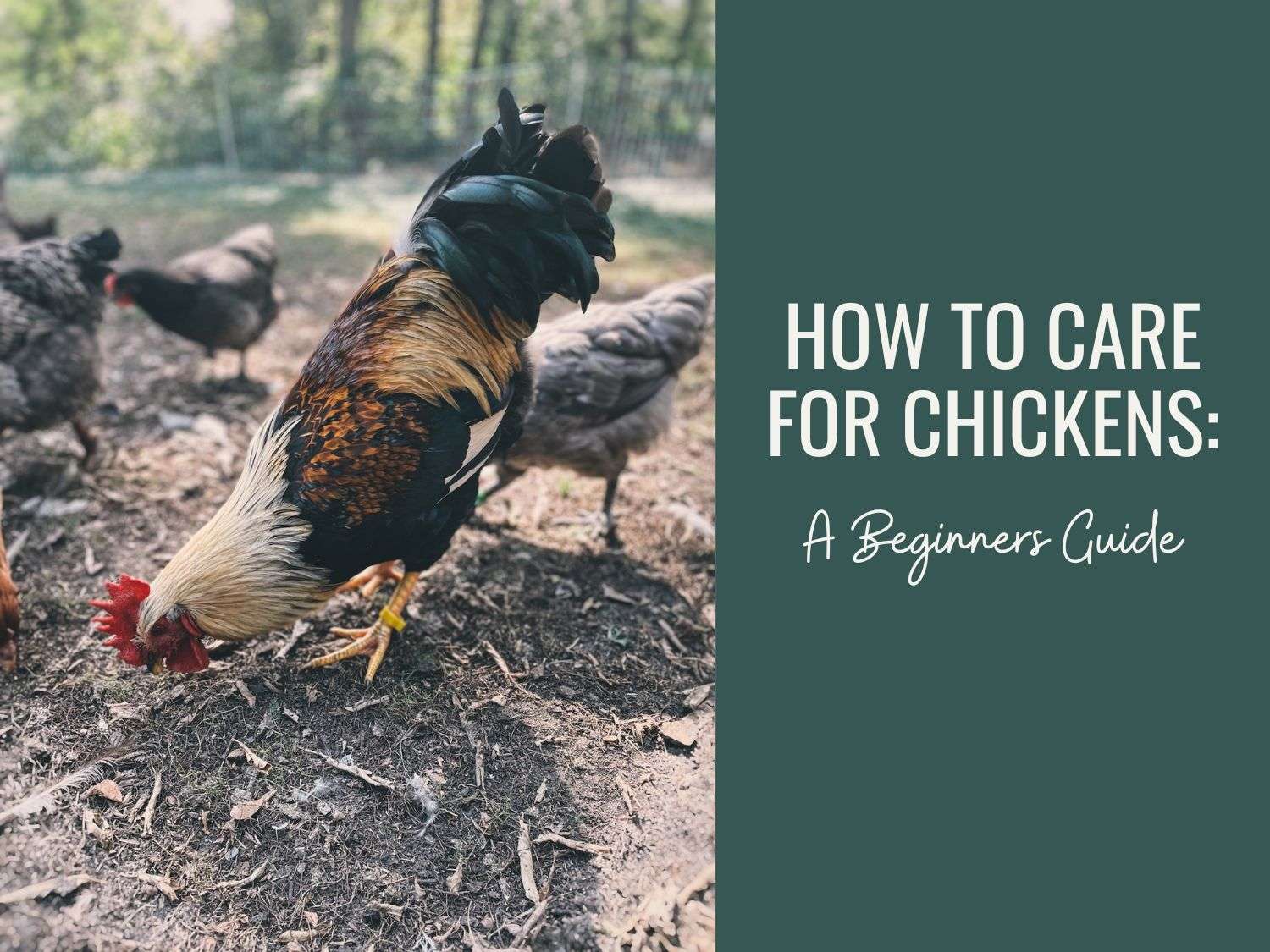If you have celery lying around that looks a little limp, you’re probably wondering “Can chickens eat celery?” You’re not alone! I get asked this question all the time.
The short answer is YES, but it takes a bit of preparation unlike apples, grapes, or blackberries, which are soft enough for them to rapidly devour. So, what’s the best way to feed celery to chickens? Should it be cooked first, or is raw okay? Will the strings cause crop impaction?
To get to the bottom of it, I’ve researched this topic to get all the answers and we’ll tackle the following questions together:
- Is celery safe for chickens?
- Can chickens eat celery raw?
- How much can they eat?
- What’s the best way to feed celery to chickens?
- What’s the nutritional value of celery?
- What foods are toxic to chickens?
- Plus, much more!
Let’s dive in!
*Disclosure: This post may contain affiliate links to products (including Amazon). I’ll earn a small commission if you purchase through my link, at no additional cost to you! Regardless, I only link to products that I personally use on our homestead or believe in.
Can Chickens Eat Celery?
Yep – your chickens can certainly eat celery! Celery is a nutritious treat for your flock and a great way to make use of a bunch that has gone limp and no longer has that satisfying crunch. However, celery is still quite large, stringy, and firm in texture, making it hard for chickens to consume as-is. Read on to see what to do about that!
While celery is not toxic to chickens, there are a few things out there that are and should be avoided. We’ll cover that further down as well so that you can ensure that your flock stays safe.
Can chickens eat celery raw?
Chickens can eat celery raw, but it needs to be chopped up into bite-size pieces first (1/4″ or smaller). If you just throw the whole stalk out there, they’ll likely try to peck at it but will quickly give up. Chickens don’t have teeth, so they can’t bite off pieces like you and I can!
Celery is also very stringy, which can increase the risk of crop impaction if they eat too many long strings of it (similar to fodder when it is grown for too long). You definitely don’t want that, so take your time chopping it up beforehand.
If you want to cook the celery first to make it even easier on your flock, that’s fine too! They’ll enjoy celery cooked or raw, as long as the pieces are small enough for them to manage.
Can chickens eat celery leaves?
Absolutely! I’d venture to say that chickens actually prefer the leaves over the stalks. They go crazy for them! If you typically throw away the top set of celery leaves anyway, definitely offer them to your chickens next time.
How much celery can chickens eat?
While celery contains good amounts of fiber and nutrients, it’s important not to overdo it. I would keep it to 1 cup of chopped celery for a flock of 8-10 chickens. Thankfully, celery is low in sugar compared to other treats like bananas and grapes, but there are other factors to consider.
Celery is low in protein (only 0.8g per cup!) and a protein-deficient diet can result in a reduction in egg laying and reduced hatchability of their eggs. So, it’s important to keep the greens as a supplement to their diet, in addition to a high-quality, balanced feed.
What is the Best Way to Feed Celery to Chickens?
The most important step is to chop the celery up into bite-size pieces. Chickens don’t have teeth, so they’ll likely give up on the whole stalk, or worse, choke while giving it a try. The ideal size for chickens is 1/4″ pieces or less. Get out our knife, slap chop, or even your food processor and your flock will thank you!
I prefer to spread treats like celery, blackberries, or apples out in the yard, rather than their run. That’s because the run is dusty and full of chicken poo. Not ideal for a snacking surface!
Do Chickens Even Like to Eat Celery?
Chickens will eat celery, but I will say that it’s not their absolute favorite. So, if you’re spreading out some celery in the yard where there are also other tasty greens like clover and bugs to peck at, they may not be too excited. However, if it’s in the dead of winter, then they’ll think it’s the best thing ever!
Of course, every flock is different – one flock might absolutely love celery whereas the other won’t touch it. You won’t know until you give it a try!
The Health Benefits of Celery for Chickens
Celery is a delicious, nutritious snack that you can provide to your chickens from time to time. They are loaded with fiber, vitamin C, calcium, and vitamin K. They are A great boost for strong bones and eggshells!
Fiber
One cup of chopped celery brings in 2g of fiber, which is an important component for chicken gut health. Chickens have a diverse microbiome (just like us) that hosts more than 900 unique strains of microorganisms that flourish with consistent fiber intake.
Vitamins and minerals
Celery is more than just fiber and water; it provides some great nutrients to support the health of your flock such as calcium, vitamin C, and vitamin K! Let’s break them down.
- Vitamin C: Improves their stress response, and disease resistance and combats free radical damage. It also improves their laying rate and hatch potential!
- Calcium: This mineral is probably the most well-known when it comes to chickens. It’s key for those strong eggshells and strong bones!
- Vitamin K: Vitamin K works in concert with calcium to improve bone health and strength.
Hydration
Celery contains a decent amount of water, but not quite as high as grapes and apples. Even still, they can be a great, hydrating treat during those hot summer days!
Nutritional breakdown of celery
Want more information? Here’s what 1 cup of chopped celery provides according to USDA FoodData Central. Of course, don’t feed each of your chickens an entire cup, but I like to look at food in portions that we are familiar with.
What Foods are Toxic to Chickens?
Thankfully, chickens LOVE eating just about any scraps that you’re willing to give them, but there are a few things that should never be eaten by chickens:
- Raw potato peels
- Avocado pit and peel
- Dry/uncooked beans
- Anything moldy or rotten
- Fried foods
- Salty foods
- Caffeine or alcohol
- High-fat foods
- High-sugar foods
- Artificial sugars
Another thing to consider avoiding is strong-flavored foods. These flavors can end up in your morning eggs, resulting in a pungent breakfast! Pee-yew!
- Garlic
- Onions
- Fish
Other Chicken Articles You’ll Love:
Final Thoughts
Well, that was fun and hopefully, you’re now feeling confident about feeding some leftover celery to your flock as a treat. They will absolutely love it and it’s a nice nutrient boost as well.
Are you a first-time chicken keeper? Or maybe you don’t even have chickens yet? Definitely check out my ultimate resource: How to Care for Chickens: A Beginners Guide.
*Information in this article was referenced from personal experience and/or from my favorite chicken books The Chicken Health Handbook & Storey’s Guide to Raising Chickens unless otherwise noted.
The Homesteading RD's Product Picks Over the years, I've found that the chicken health sections in the 2 books above are just not thorough enough. This chicken health handbook is a great resource to have for whatever health issues come your way. This is my go-to chicken book! Full of practical advice. It covers everything you need to know from coop design, chicken health and incubating eggs.

